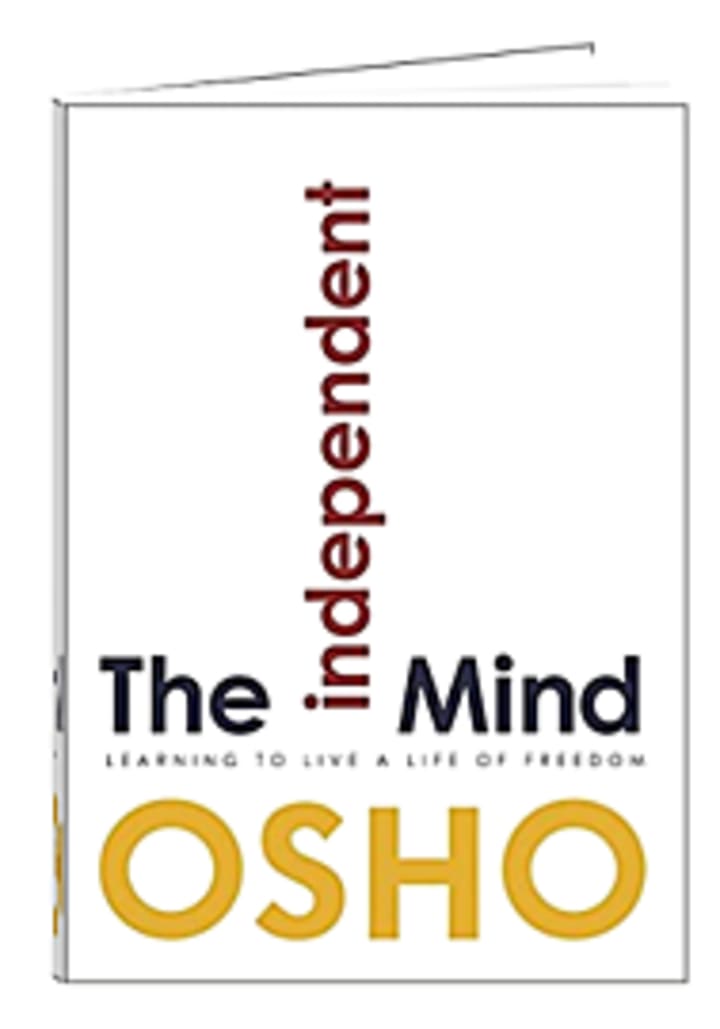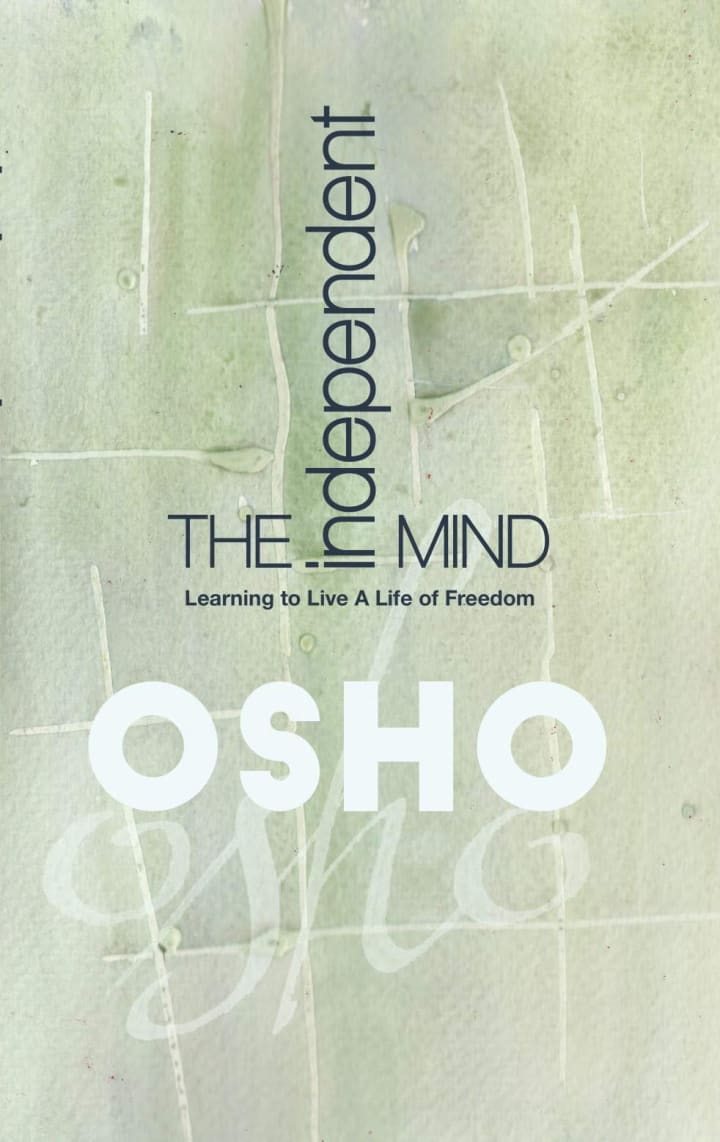"The Independent Mind"
A Guide to Cultivating Inner Freedom and Living a Fulfilling Life.

"The Independent Mind"
"The Independent Mind" by Osho is a thought-provoking book that explores the idea of independence and how it relates to our personal growth and happiness. The book offers practical advice, exercises, and inspiring stories to help readers cultivate an independent mindset and live a fulfilling life.
Osho argues that true independence comes from within, and it is a state of mind that allows us to think, feel, and act freely, without being influenced by external factors. He believes that we all have the potential to be independent, but often we get trapped in patterns of thinking and behaving that limit our freedom and hinder our progress.
The first part of the book focuses on the importance of self-awareness and self-knowledge. Osho encourages readers to take a deep look at themselves and understand their values, beliefs, and emotions. He explains that self-awareness is the foundation of independence because it allows us to make conscious choices that align with our authentic selves.

To help readers develop their self-awareness, Osho provides a variety of exercises and techniques, such as meditation, mindfulness, and self-reflection. He also emphasizes the importance of letting go of the past and living in the present moment, as it allows us to fully experience our lives and connect with our inner selves.
The second part of the book delves into the different areas of our lives that require independence, such as relationships, work, and spirituality. Osho explains that we often fall into the trap of seeking approval and validation from others, which can lead to dependency and unhappiness. He encourages readers to cultivate healthy boundaries and assertiveness, so they can maintain their autonomy and integrity in all aspects of their lives.
In the chapter on relationships, Osho discusses the importance of choosing partners who support our independence and growth. He explains that a healthy relationship is based on mutual respect, trust, and freedom, and that we should never compromise our values and goals for the sake of pleasing someone else.
In the chapter on work, Osho encourages readers to pursue careers that align with their passions and values, and to create their own paths if they don't fit into the traditional mold. He emphasizes the importance of taking risks, learning from failures, and persisting in the face of obstacles, as these are the qualities that define successful and independent people.
In the chapter on spirituality, Osho explores the concept of inner freedom and how it relates to our relationship with the divine. He explains that true spirituality is not about following a set of rules or beliefs, but about connecting with our inner selves and discovering our own truth. He encourages readers to let go of dogma and embrace their own spiritual journey, whatever that may be.
The third part of the book focuses on the challenges and obstacles that can hinder our independence, such as fear, anxiety, and self-doubt. Osho explains that these emotions are normal and inevitable, but we can learn to manage them and use them as opportunities for growth.
In the chapter on fear, Osho provides practical strategies for overcoming it, such as facing it head-on, reframing it as a challenge, and seeking support from others. He explains that fear is often a sign that we are stepping out of our comfort zone, and that we should embrace it as a natural part of the growth process.
In the chapter on anxiety, Osho explains that it is often caused by our need for control and certainty, and that we can learn to manage it by practicing mindfulness, self-care, and positive self-talk. He also emphasizes the importance of seeking professional help if anxiety becomes overwhelming or interferes with our daily life.
In the final part of the book, Osho offers a roadmap for living a liberated life, which includes cultivating an independent mindset, setting goals, and taking action.
Conclusion:
In conclusion, "The Independent Mind" by Osho is a powerful and insightful book that offers practical guidance for cultivating an independent mindset and living a fulfilling life. Through his teachings and examples, Osho shows us that true independence comes from within, and it requires self-awareness, courage, and perseverance.
By exploring various aspects of our lives, such as relationships, work, and spirituality, Osho provides a holistic approach to independence, showing us how we can apply it to all areas of our lives. He emphasizes the importance of healthy boundaries, assertiveness, and self-reflection, and encourages us to let go of patterns of thinking and behaving that limit our potential.
Moreover, Osho addresses common obstacles to independence, such as fear and anxiety, and offers practical strategies for managing them. He emphasizes the importance of seeking professional help when needed, and encourages us to embrace these emotions as opportunities for growth and transformation.
Overall, "The Independent Mind" is a valuable resource for anyone seeking to live a more liberated and authentic life. Through Osho's teachings and practices, readers can learn to cultivate a sense of inner freedom and independence that will guide them towards their true selves and their highest potential.
"The Independent Mind" by Osho is a thought-provoking book that explores the idea of independence and how it relates to our personal growth and happiness. The book offers practical advice, exercises, and inspiring stories to help readers cultivate an independent mindset and live a fulfilling life.
Osho argues that true independence comes from within, and it is a state of mind that allows us to think, feel, and act freely, without being influenced by external factors. He believes that we all have the potential to be independent, but often we get trapped in patterns of thinking and behaving that limit our freedom and hinder our progress.
The first part of the book focuses on the importance of self-awareness and self-knowledge. Osho encourages readers to take a deep look at themselves and understand their values, beliefs, and emotions. He explains that self-awareness is the foundation of independence because it allows us to make conscious choices that align with our authentic selves.
To help readers develop their self-awareness, Osho provides a variety of exercises and techniques, such as meditation, mindfulness, and self-reflection. He also emphasizes the importance of letting go of the past and living in the present moment, as it allows us to fully experience our lives and connect with our inner selves.
The second part of the book delves into the different areas of our lives that require independence, such as relationships, work, and spirituality. Osho explains that we often fall into the trap of seeking approval and validation from others, which can lead to dependency and unhappiness. He encourages readers to cultivate healthy boundaries and assertiveness, so they can maintain their autonomy and integrity in all aspects of their lives.
In the chapter on relationships, Osho discusses the importance of choosing partners who support our independence and growth. He explains that a healthy relationship is based on mutual respect, trust, and freedom, and that we should never compromise our values and goals for the sake of pleasing someone else.
In the chapter on work, Osho encourages readers to pursue careers that align with their passions and values, and to create their own paths if they don't fit into the traditional mold. He emphasizes the importance of taking risks, learning from failures, and persisting in the face of obstacles, as these are the qualities that define successful and independent people.
In the chapter on spirituality, Osho explores the concept of inner freedom and how it relates to our relationship with the divine. He explains that true spirituality is not about following a set of rules or beliefs, but about connecting with our inner selves and discovering our own truth. He encourages readers to let go of dogma and embrace their own spiritual journey, whatever that may be.
The third part of the book focuses on the challenges and obstacles that can hinder our independence, such as fear, anxiety, and self-doubt. Osho explains that these emotions are normal and inevitable, but we can learn to manage them and use them as opportunities for growth.
In the chapter on fear, Osho provides practical strategies for overcoming it, such as facing it head-on, reframing it as a challenge, and seeking support from others. He explains that fear is often a sign that we are stepping out of our comfort zone, and that we should embrace it as a natural part of the growth process.
In the chapter on anxiety, Osho explains that it is often caused by our need for control and certainty, and that we can learn to manage it by practicing mindfulness, self-care, and positive self-talk. He also emphasizes the importance of seeking professional help if anxiety becomes overwhelming or interferes with our daily life.
In the final part of the book, Osho offers a roadmap for living a liberated life, which includes cultivating an independent mindset, setting goals, and taking action.

Conclusion:
In conclusion, "The Independent Mind" by Osho is a powerful and insightful book that offers practical guidance for cultivating an independent mindset and living a fulfilling life. Through his teachings and examples, Osho shows us that true independence comes from within, and it requires self-awareness, courage, and perseverance.
By exploring various aspects of our lives, such as relationships, work, and spirituality, Osho provides a holistic approach to independence, showing us how we can apply it to all areas of our lives. He emphasizes the importance of healthy boundaries, assertiveness, and self-reflection, and encourages us to let go of patterns of thinking and behaving that limit our potential.
Moreover, Osho addresses common obstacles to independence, such as fear and anxiety, and offers practical strategies for managing them. He emphasizes the importance of seeking professional help when needed, and encourages us to embrace these emotions as opportunities for growth and transformation.
Overall, "The Independent Mind" is a valuable resource for anyone seeking to live a more liberated and authentic life. Through Osho's teachings and practices, readers can learn to cultivate a sense of inner freedom and independence that will guide them towards their true selves and their highest potential.






Comments
There are no comments for this story
Be the first to respond and start the conversation.